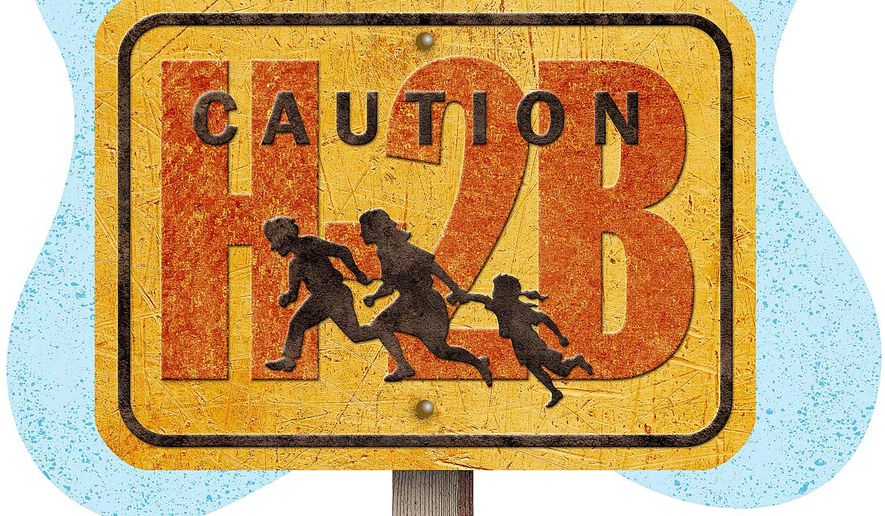OPINION:
President Trump won the White House in 2016 by campaigning for immigration policies that would put the interests of American workers first, ahead of employers who wish to bring in large numbers of foreign workers who will work for lower wages. But if some members of Congress have their way, the lame duck will provide employers with a boost in foreign labor at the expense of low-skilled American workers.
Recently, The Washington Times reported on a memorandum of understanding (MOU) between staffers of four Republican congressmen and two business groups that lobby for more foreign workers — the H-2B Workforce Coalition and the Seasonal Employment Alliance.
The MOU states that “Congressional staff and H-2B advocates agree the annual number of available visas for the H-2B program will be increased from 66,000 to 132,000 with any cap increase retroactive to the start of fiscal year 2019.” This increase would be permanent. Further, the MOU moves certain H-2B professions into other visa categories, freeing up even more visas, and exempts work in disaster areas from the cap.
The agreement could become a key issue over the next week while lawmakers negotiate a deal to avoid a partial government shutdown. Funding for the Department of Homeland Security runs out on Dec. 7, and the spending bill approved by the House Appropriations Committee to fund the agency back in July includes a provision that would exempt certain H-2B workers from the annual cap — a provision that would effectively increase the number of H-2B visas issued each year. Rep. Andy Harris, Maryland Republican, offered the amendment, and a staffer from his office signed onto the MOU.
The H-2B visa is a low-skilled guest worker program that provides employers with 66,000 foreign workers each year for temporary or seasonal employment. Employers claim that they’re unable to find American workers to do these jobs, and yet these businesses have managed to survive year after year without permanent increases to the annual cap. Still, they continue their relentless push for access to more foreign workers.
While resorts and fisheries tend to receive most of the media’s attention, landscapers receive the largest share of H-2B visas, accounting for at least half of the 66,000 visas issued each year. These employers may claim that they can’t find American workers to do these jobs, but according to analysis of government data by the Center for Immigration Studies, 66 percent of landscapers are native-born, dispelling the myth that Americans won’t do these jobs.
What low-skilled American workers want in exchange for doing these jobs is a decent wage.
Economists agree that wages for Americans without a college education have been stagnant. And for Americans with a high school degree or less, real wages have declined over the last several decades. It’s this pool of workers that is in direct competition with H-2B workers.
The overall national unemployment rate may be at a historically low level, but the rate doesn’t tell the true story for low-skilled American workers. In October, only 44.9 percent of Americans with a high school degree or less had a job compared with 71.9 percent of Americans with a bachelor’s degree or higher, according to the Bureau of Labor Statistics. And it’s not much better for Americans with only a high school degree; only 55.3 percent currently hold a job.
Teenagers have also been hurt by the creation of the H-2B visa. It wasn’t too long ago that you would see high schoolers and college students mowing lawns or serving ice cream at a nearby vacation spot during the summer months. But during the summer of 2018, only 35 percent of native-born teens held jobs compared to 53 percent just 20 years ago.
More than 40 million working-age Americans are not working. Thirty-three million are without a college degree. Any claim that there’s a labor shortage for temporary or seasonal jobs is simply absurd. Employers have changed the definition of a worker shortage to mean not that there aren’t enough workers to fill open jobs, but that there aren’t enough Americans willing to work for the low wages employers want to pay.
Mr. Trump made a promise to the American people during the summer of 2016 that he would fight for immigration policies that “boost wages and [he would] ensure that open jobs are offered to American workers first.” Shortly after taking office, he signed the “Buy American and Hire American” executive order. According to the website for U.S. Citizenship and Immigration Services, the order “seeks to create higher wages and employment rates for U.S. workers and to protect their economic interests by rigorously enforcing and administering our immigration laws.” As a result, the agency established a hotline to report suspected fraud or abuse within the H-2B visa program. And recently, the administration published a proposed rule for public comment that would improve transparency for how potential H-2B employers recruit American workers.
Unfortunately, the Republican-held Congress hasn’t backed up the president’s promise with legislation, and it may have cost his party control of the House. If Republicans in Congress use the lame-duck to subsidize employers with cheap, foreign labor at the expense of struggling American workers, it’ll only hurt their chances even more of retaining the White House and Senate in 2020.
• Chris Chmielenski is deputy director of NumbersUSA.




Please read our comment policy before commenting.